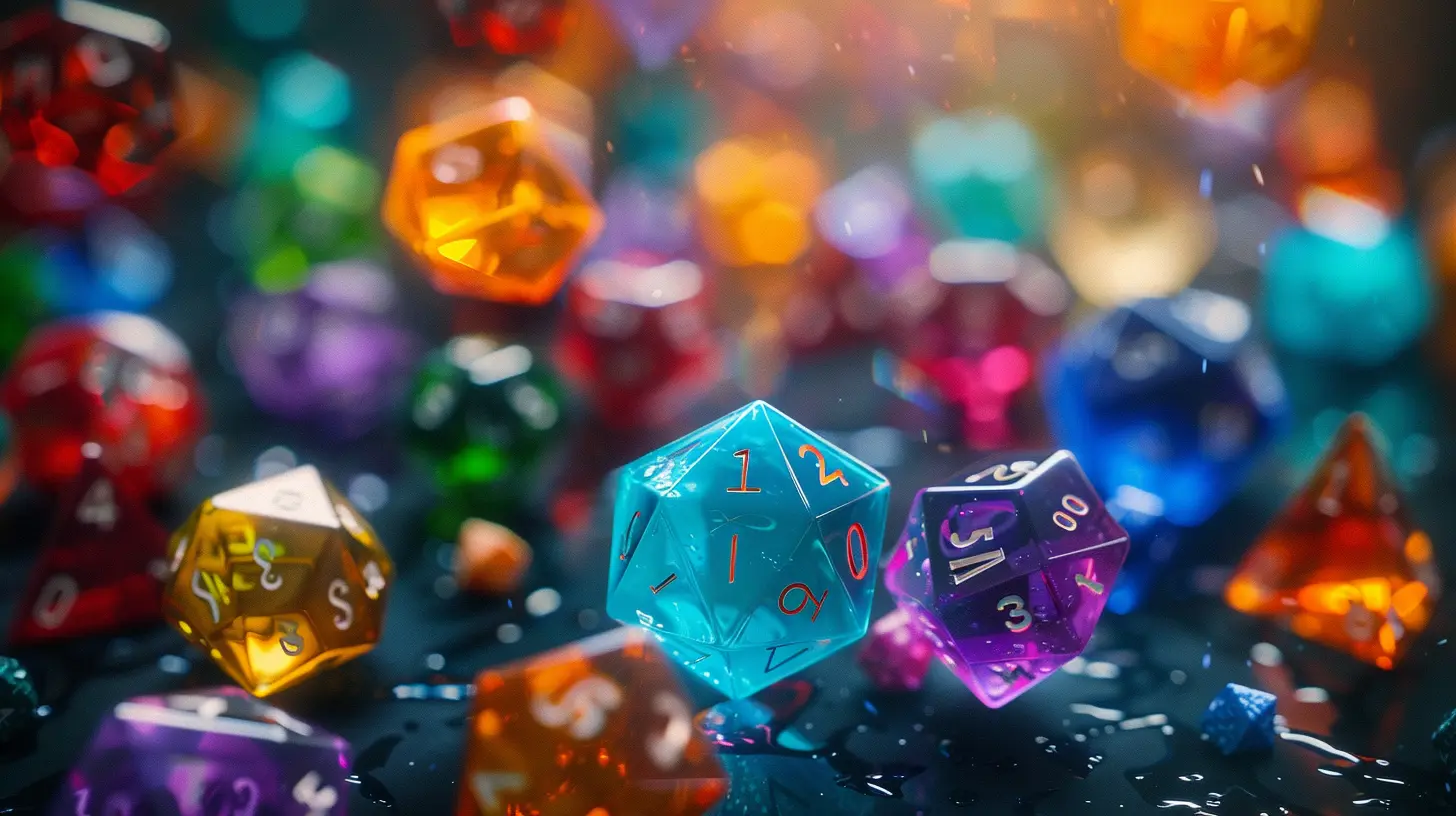Impact of Random Number Generators on Strategy and Fairness
22 September 2025
Let’s talk about Random Number Generators (RNGs). You’ve probably bumped into this term if you’ve ever dived into any serious gaming discussion—especially if a loot box didn’t go your way or that final boss landed a “crit” out of nowhere. RNGs feel like a digital roll of the dice. But they’re more than just game chance engines. They sit at the heart of nearly every game you’ve played, tinkering with outcomes, spicing up predictability, and sometimes shaking our belief in what’s fair and what’s just digital fate.
So, what exactly is RNG? How deep does its rabbit hole go in terms of strategy and fairness? Buckle up, because things are about to get random—but in the most calculated way possible.
🎰 What Is A Random Number Generator (RNG), Really?
Let’s not get all technical for the sake of it. At its core, an RNG is exactly what it sounds like—a system, algorithm, or tool that generates numbers... randomly. Or at least it tries to.In gaming, RNG is what decides if you land that critical hit, if the enemy drops a rare weapon, or even if the Pokémon you bump into is shiny. It injects unpredictability into games, making each experience feel different. Without it, games would feel like baking the same cake again and again from a precise recipe. Predictable. Boring.
But here’s the kicker—true randomness is super hard to generate using computers (they’re way too logical). So, most games use something called a "Pseudo-Random Number Generator" (PRNG). It’s not actually random in the cosmic flip-of-a-coin sense, but for us players? It’s close enough to keep things spicy.
🎮 The RNG Effect: Strategy Meets Chaos
Let’s imagine you’re playing a tactical RPG. You align your party, optimize upgrades, execute your plan flawlessly—and then RNG flips the bird and your 95% hit chance misses. Sound familiar?🎯 Luck or Strategy?
Games have always danced between skill and chance. Chess is pure strategy. Poker requires both your brain and a bit of luck. Modern games are no different. RNG adds a layer of chaos to the mix, and that chaos can either be a game-changer or a game-breaker.Games like XCOM, Hearthstone, or even roguelikes like Hades rely heavily on RNG to create tension and replayability. But here’s the dilemma: too much randomness and it feels like your choices don’t matter. Too little, and the game becomes stale.
Developers walk a fine line. They want each playthrough to feel fresh, but they also want to reward skill. That’s where controlled randomness—like weighted RNG or RNG manipulation—comes in.
♟️ Can You Strategize Around RNG?
Absolutely. Think of RNG like weather in your favorite battle royale game. You can’t control it, but you can prepare for it. Smart players plan multiple contingencies. They adapt. They calculate odds and play the long game.In games like Genshin Impact or Fire Emblem, managing RNG becomes part of the meta-strategy. You pray for lucky drops or rolls—but you also plan in case luck doesn’t swing your way. It’s like buying an umbrella even if the forecast says it’s sunny.
So, RNG doesn’t kill strategy—it just makes it more nuanced.
🎲 The Fairness Debate: Is RNG Cheating Us?
If RNG decides who wins, is that fair? That’s the million-dollar question.🤔 “It’s Not Me, It’s The RNG!”
We’ve all uttered that in frustration. When you’ve played your heart out, followed every step perfectly, and still lost thanks to a random miss or unlucky loot... it feels less like a game and more like a cruel joke.RNG-induced losses can feel unfair, especially in games with ranking systems or competitive play. Players want to believe that winning is based on skill, not chance. When chance trumps skill, it chips away at trust.
🧪 Fairness Through Balance
Here’s the deal: good RNG doesn't mean equal outcomes—it means balanced unpredictability.Smart game designers build systems where RNG acts as a spice, not the main course. For example:
- “Pity Timers”: Games like Genshin or Hearthstone reward players after a streak of bad luck, ensuring RNG evens out over time.
- Dynamic RNG: In games like Fire Emblem, the system tilts odds based on previous rolls (like flipping a weighted coin to simulate fairness).
- Transparency: Some games show actual percentage odds, helping players manage expectations.
When RNG is balanced and predictable in the long run, players trust the system more—even if the moment-to-moment randomness still stings.
🕹️ RNG in Single-Player vs. Multiplayer Games
Random chance in single-player games? Usually fun. It keeps things unpredictable and ensures no two runs are the same. Think Binding of Isaac, Slay the Spire, or Diablo.But RNG in multiplayer arenas? That’s where things get messy.
💥 RNG in Competitive Games
Imagine losing an esports match because the other guy got lucky. Not a good look. That’s why competitive titles like League of Legends, Dota 2, or Valorant minimize RNG wherever possible.But not all randomness is bad in PvP:
- Card games: Like Hearthstone or Magic: The Gathering, live on RNG. The skill lies in managing uncertainty, not eliminating it.
- Battle royale games: Use RNG in loot drops and circle zones to force adaptability. It keeps matches from becoming repetitive.
Still, when real rankings or cash prizes are involved, players expect fairness. RNG must be tightly controlled—or at least mathematically balanced.
🌐 RNG and Gambling Mechanics: A Slippery Slope
Let’s talk loot boxes. Yeah, we’re going there.RNG’s cousin—gacha mechanics—has sparked heated debates in the gaming world. When real-world money enters the picture, RNG starts to resemble gambling. And not in a fun Vegas weekend way—more like a predatory slot machine in your pocket.
Games like FIFA (card packs), Genshin Impact (wish system), and Overwatch (loot crates) have leaned heavily on random rewards. The controversy? Players can spend hundreds—even thousands—without getting the outcome they want.
Some countries have even started regulating loot boxes as gambling. That’s how serious things have gotten.
🧠 The Psychology of Random Rewards
There’s a reason RNG-based systems are so compelling—they tap into something primal. The unpredictability of rewards creates a dopamine loop. Think Pavlov’s dog meets modern monetization.The fairness issue becomes murky when players are paying for RNG. Free-to-play games walk a tightrope. Too generous and they lose revenue. Too stingy and they lose players.
Balance here isn’t just about game design—it’s about ethics.
🧩 RNG and Player Perception: It’s All In Your Head?
Ever notice how people remember bad rolls more than good ones?That’s no accident. It’s called “negativity bias,” and it plays a huge role in how we perceive RNG. We’ll curse a missed 95% hit but forget the three lucky crits that came before it.
Games that feel unfair often aren't—our brains just like to highlight the low points. That’s why good UI, visual feedback, and expectation management are vital. If a game shows you the odds and shows you the math behind rolls, it builds trust.
Some devs go further—explaining how RNG works under the hood. Transparency creates trust, which softens the blow of bad luck.
🧠 How Devs Tame RNG Without Killing the Fun
Game designers have some clever tricks up their sleeves to keep RNG engaging but not frustrating. Some of them include:- Seeded RNG: Makes certain events reproducible (great for speedrunning or competing on even footing).
- Procedural Generation: RNG that creates new levels or scenarios (think Minecraft or No Man’s Sky).
- RNG Manipulation: Some games let skilled players influence the randomness through mechanics or timing.
And then there’s the holy grail—“good RNG”. That’s when randomness feels exciting, but not cheap. It rewards risk-taking without punishing preparation.
🧭 Can RNG Ever Be Truly Fair?
That depends on how you define “fair.”Fairness doesn’t always mean equal chances for everyone. In games, fairness is about consistency and transparency. If players understand the system, know the odds, and believe the outcomes aren’t rigged—they’ll usually accept the roll of the dice.
Just like in real life, randomness is part of the thrill. It’s what makes victory sweeter and failure more bearable... most of the time.
🎤 Final Thoughts: RNG—A Blessing or a Curse?
RNG is like fire. It can warm your game world, light up your playthroughs, or burn down your carefully laid plans. Love it or hate it, RNG is here to stay. It touches everything from strategy to fairness, from adventure to competition.The key isn’t about getting rid of it—it’s about wielding it wisely. When randomness feels earned, when outcomes feel (somewhat) predictable, and when every roll tells a story—you get magic. Gaming magic, to be precise.
So, the next time you lose a match, whiff a spell, or miss that shiny, take a breath. Maybe it wasn’t just bad luck. Maybe it was RNG doing its mysterious dance—testing your patience, sharpening your strategy, and daring you to roll the dice again.
all images in this post were generated using AI tools
Category:
Game MechanicsAuthor:

Pascal Jennings
Discussion
rate this article
1 comments
Lexi Jenkins
Random Number Generators: the magic wands of gaming! One minute, you're a hero slaying dragons; the next, you're tripping over your own feet. Who knew strategy meant "hold your breath and pray" instead of a master plan? 🎲✨
September 29, 2025 at 2:54 AM

Pascal Jennings
Absolutely! Random Number Generators add an unpredictable element that can enhance excitement but also complicate strategic planning, making each game unique and dynamic. 🎲✨


